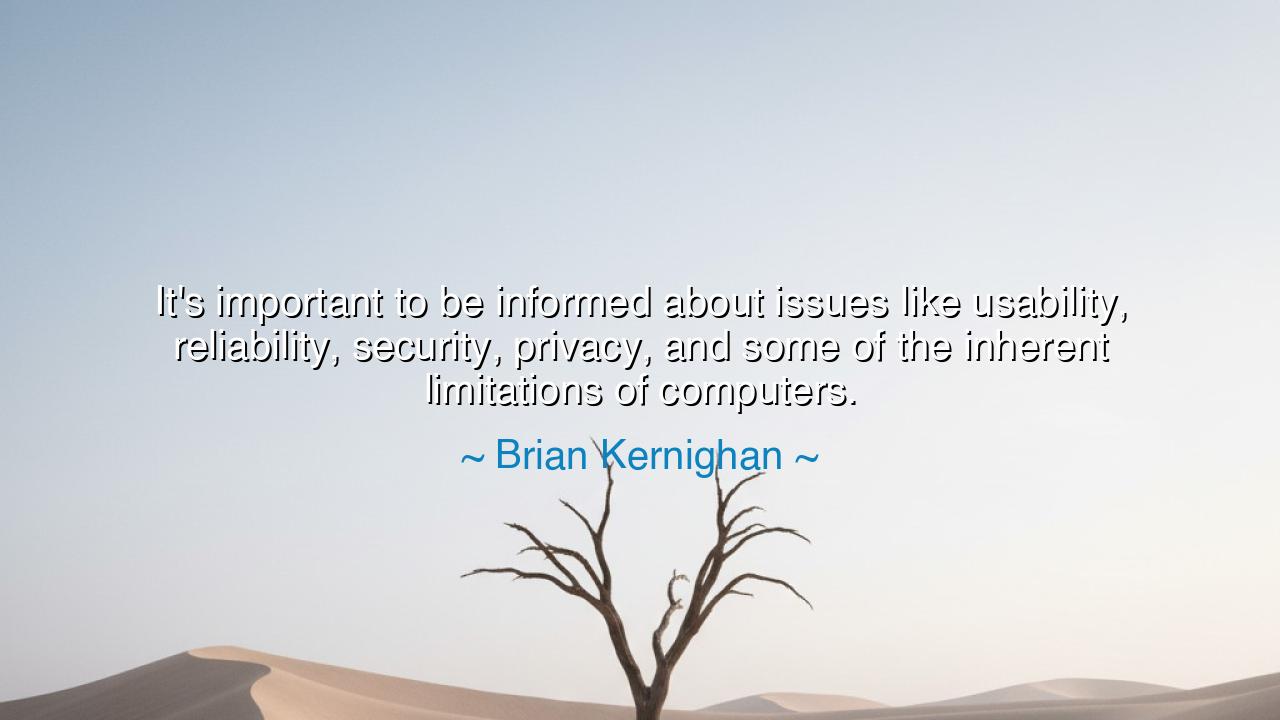
It's important to be informed about issues like usability
It's important to be informed about issues like usability, reliability, security, privacy, and some of the inherent limitations of computers.






In the wise and far-seeing words of Brian Kernighan, one of the great architects of the digital age, we are reminded of the humility and vigilance that must accompany all knowledge: “It’s important to be informed about issues like usability, reliability, security, privacy, and some of the inherent limitations of computers.” These words are not spoken in the excitement of invention, but in the calm wisdom of reflection. Kernighan, who helped shape the very foundations of modern computing, speaks here not to the engineers alone, but to all who live in the shadow and light of technology. His voice is a gentle warning to a generation that has built vast power through machines, yet often forgets to question their limits or understand their dangers.
From the time of the ancients, the wise have taught that knowledge without understanding is perilous. Fire itself, the first technology, gave warmth to humankind — but it also burned those who wielded it carelessly. So too are computers the fire of our age: instruments of immense creation and destruction, capable of transforming the world yet always bound by their design. Kernighan, one of the fathers of the programming language C, and a contributor to UNIX, knows better than most that no machine, however complex, possesses wisdom. It obeys, it calculates, it processes — but it does not discern. Thus, his call to awareness — to be informed about usability, reliability, security, and privacy — is a call for human mastery over the very tools we have forged.
The origin of this quote lies in Kernighan’s lifelong mission as a teacher and thinker. Having witnessed the birth of computing, he also foresaw its potential to overtake human reason. His warning is not of hostility, but of imbalance — that as the machine grows in capability, humanity must grow in understanding. He reminds us that computers, though powerful, are still limited, shaped by the imperfections of their creators. Every algorithm reflects a bias; every network carries vulnerability. To forget this truth is to fall into the ancient error of hubris — to mistake one’s creation for a god.
Consider the story of Icarus, the youth who flew upon wings of wax and feathers, lifted by his father’s genius but blinded by his own ambition. His flight was glorious — until he rose too near the sun and fell. In our time, the wings are digital, the wax is code, and the sun is the illusion of infallibility. We soar higher with data, faster with algorithms, and yet we risk the same fall if we forget what Kernighan teaches: that every system has its limitations, and every power carries its shadow. The fall of great networks — breaches of security, invasions of privacy, collapses of trust — are not accidents of technology, but failures of wisdom.
Kernighan’s invocation of usability and reliability touches the essence of good design: that technology must serve the human, not enslave him. The ancients understood that the best tools were those that extended human ability without corrupting the spirit. A sword was not made merely to cut, but to protect; a plow not merely to till, but to sustain life. Likewise, computers must be built and used with intention — to simplify, to empower, to enlighten — but never to dominate. The wise creator builds not only with intelligence but with conscience, for the tool without ethics becomes an engine of chaos.
In his mention of security and privacy, Kernighan reaches deeper still — to the moral heart of the digital age. The ancients guarded their temples, their scrolls, and their sacred knowledge with care; we must now guard our data, our identities, and our truths with the same devotion. To neglect security is to invite corruption; to ignore privacy is to surrender freedom. The modern person, surrounded by invisible networks, must become as vigilant as the old watchmen of the city walls — awake, discerning, and aware that danger hides even in silence.
Let this, then, be the lesson carried forward: wisdom must grow as power grows. To use technology well, we must know its flaws; to command it rightly, we must respect its limits. Do not trust the machine blindly, nor fear it, but understand it. Learn its language, its strengths, and its weaknesses. Protect your mind from dependence and your data from deceit. As Brian Kernighan teaches, the future belongs not to those who create technology, but to those who comprehend it — who remember that a tool, no matter how advanced, is still only as noble as the hand that wields it.
And so, O listener, take these words as both warning and hope. The age of computers is young, but its reach is vast. Let not its brilliance blind you, nor its complexity dismay you. Approach it with curiosity, humility, and discipline. For the wise know that the greatest power is not in the machine itself, but in the one who understands its nature — and chooses, with wisdom and restraint, how to use it.






AAdministratorAdministrator
Welcome, honored guests. Please leave a comment, we will respond soon